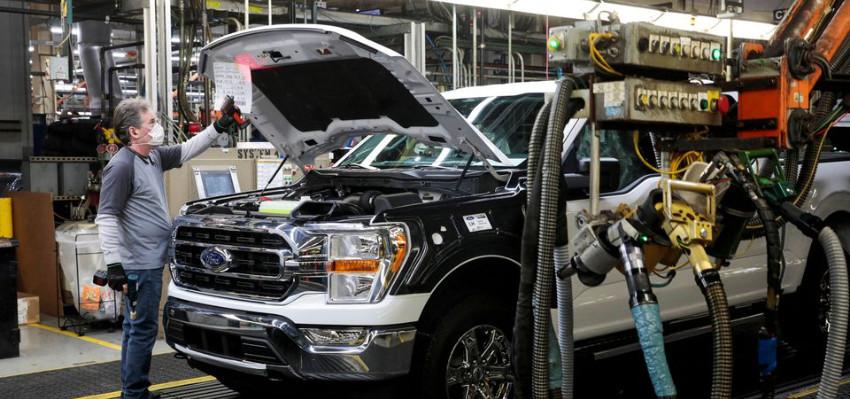Car stuff (public number: chedongxi)
Author | The Way
Edited | Mumi
According to Reuters, automakers including General Motors, Ford and Hyundai are optimistically predicting that chip restrictions will be eased in the second half of 2022.
Considering the impact of the epidemic on chip production and the obstructive effect of other emerging technologies, automotive chipmakers hold the opposite view, expecting the recovery to take longer.
It is reported that Ford will cut North American car production in the near future, Apple has turned the iPad universal chip to the iPhone 13, the company's optimism is really "optimistic", the original sadness is true!
First, GM Ford and Hyundai are more optimistic, but Ford has sought foreign assistance
Automakers such as GM, Ford and Hyundai predict that the supply of automotive chips will improve significantly this year. GM CEO Mary Barra predicts that semiconductor shortages will decrease in the second half of 2022; Hyundai predicts that chip supply will return to normal levels in the third quarter of this year; and Ford is optimistic that chip shortages will improve significantly in the second half of the year after low car sales in the first quarter of this year.
Ford, while optimistic, has partnered with GlobalFoundries to reduce its reliance on TSMC's mature process chips. Ford CEO James Farley said they rely heavily on TSMC chips. Obviously, if left unchecked, as the industry shifts to more advanced nodes, its own production capacity will face extremely high risks. He said Ford will pay for a chip with Global Foundationries to develop a mature process, though it will be difficult for the chipmaker to produce such chips in the United States in a short period of time. James Farley also said they have learned from their past experience that mistakes such as losing the management of the core supply chain that are critical to vehicle electrification and digital transformation for their own reasons cannot be repeated.

Ford employees are assembling cars
Second, NXP and Infineon said the situation is cold The production capacity of other chip companies is still improving
Despite the increase in production, leading automotive chipmakers such as NXP and Infineon are still negatively predicting that the supply tightness will continue for a long time. Manufacturers' perceptions of the chip shortage, the most pressing problem facing the automotive industry, depend on the uncertainty of their recovery of production capacity in the COVID-19 pandemic and the factors that may hinder their efforts to transition to new chip-intensive technologies, such as electrification, assisted driving/autonomous driving, which are likely to threaten chip production, so these automotive chipmakers are not optimistic. In addition, Infineon said that the balance of supply and demand for some chips will improve in the second half of this year, but the mature chip market, which is crucial for automakers, will remain nervous. NXP also said the industry will not get rid of the imbalance between supply and demand this year.
Qualcomm's optimism is not obvious, with chief financial officer Akash Palkhiwala saying peers should prioritize the automotive business; Apple CEO Tim Cook said that while semiconductor manufacturers have the incentive to focus on the latest and most expensive chips, there are severe supply constraints on chips from mature processes, although less complex chips for power management and display devices are improving this quarter; and Peter Hanbury, a partner at Bain & Company, said. Several fabs will come online by the end of the year, which will help alleviate the chip shortage, but it will not completely solve the problem; ST has revealed that one chip factory will take several years to build, while another factory will take several years to reach maximum capacity, and they even announced in November last year that they will not see a significant increase in production capacity until 2024 or 2025, which is jaw-dropping.
Third, Tesla out of the algorithm budget Chip shortage continues until next year
Tesla manages chip supply in 2021 by including a strategy of writing new software to handle chip changes, and the chip shortage is expected to continue throughout the year before it eases next year.
Tesla CEO Elon Musk said on an earnings call last month that shortages are not a long-term problem, factory capacity is still increasing, and that the panicked purchase of chips by automakers is a big reason for the slowdown in supply chains.
Fourth, the consulting company estimates the chip shortage of cars to reduce production, and car dealers say that the trend is improving
Consultancy AlixPartners estimated in September 2021 that the chip shortage would cost the global auto industry $210 billion in revenue and 7.7 million vehicles in production in 2021. But according to automakers, the trend is shifting.
Conclusion: The character determines the opinion of who should believe in the self-judgment
Chip shortage is the current hot spot, car companies strive to find foreign aid, manufacturers also rapidly increase production lines, consulting companies forecast is not optimistic, everything is changing, a short time to improve is difficult! difficult! difficult!